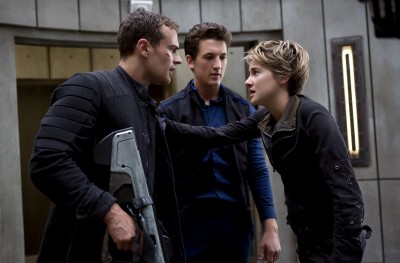
Another year, another dystopian novel adaptation. For a film that revolves around embracing differences and standing out from the crowd, “The Divergent Series: Insurgent,” the second installment of said series, does quite the opposite.
The film picks up exactly where its predecessor left off, meaning that in order to understand even an inkling of what is going on, it’s imperative to have seen “Divergent.” For those who haven’t seen it, here’s a quick recap (filled with spoilers, of course): the series takes place in a futuristic Chicago, whose citizens are divided into five separate, personality-based factions. Young adults are forced to choose a faction and commit to it for the rest of their lives.
Tris Prior (Shailene Woodley) chooses the brave Dauntless faction, though she quickly discovers that she is truly a Divergent. She actually holds defining traits of all the factions, a rare occurrence in this world. Forced to hide her status from the rest, Tris becomes more aware of the injustice in the system and works to fight against a plot threatening her loved ones. The film ends with rebellious Tris and her chums hiding from the power-hungry government.
“Insurgent,” directed by Robert Schwentke, opens with Tris, her mysterious boyfriend Four (Theo James), her cowardly brother Caleb (Ansel Elgort) and her frenemy Peter (Miles Teller) living among the peace-loving hippies of Amity, one of the five factions. The four of them are fugitives due to Tris’s recently revealed Divergent status. As we later discover, that status makes her the perfect candidate for the experiments of the government’s villainous leader, Jeanine (Kate Winslet).
The stay with Amity doesn’t last long — the fugitives are discovered, which leads to a lengthy action scene of jumps, punches and the like. Our protagonists, of course, get away and seek refuge with the Factionless, but this is only the beginning of their long journey to overthrow Jeanine.
The film, though supported by a talented cast, suffers from predictable dialogue and an unoriginal plot. Aside from the much-appreciated lack of a love triangle (though it is interesting to note that three of the male leads have played Woodley’s love interests in different films), “Insurgent” is basically just a lesser edition of “The Hunger Games.” Even the action scenes are nothing new. Tris may have an endearingly squeaky battle cry and impressive upper body strength, but the scenes play out much like any other PG-13 action movie.
In more serious scenes, Woodley succeeds at giving viewers insight into the headspace of the character, but Tris still remains boring. We aren’t interested in her backstory, her immense amount of guilt or even her unconvincing relationship with Four. Woodley’s actual performance, however, deserves praise — she seems to have done as much as she could have with the given the tepid script.
Speaking of acting abilities, the film has a lengthy list of gifted actresses whose talents are wasted on insignificant supporting roles. Zoë Kravitz’s Christina, for one, only gets to give Tris a betrayed look before she is never seen again. Naomi Watts plays Four’s estranged mother Evelyn, a role so small that she barely makes an appearance on the film’s IMDb page. Even Oscar-winner Octavia Spencer is reduced to playing Amity’s leader Johanna, who keeps mostly to herself throughout the film. If these three women were given even half of the screen time that the dreamy, yet useless, Four received, “Insurgent” would have been much better off. Maybe.
But the film doesn’t ignore all of its casted talent. Fresh off his role in the Academy Award-winning “Whiplash,” Miles Teller executes one of the best performances in the film. He perfectly delivers candid one-liners all throughout and banters quite well with Woodley and Elgort. If there’s anyone who can pull off the role of an endearing jerk, it’s Teller.
In the end, though, there is no amount of excellent acting that can overcome an uninspired plot. In a world obsessed with adapting dystopian young adult novels, these films need to work a lot harder to distinguish themselves from the others. And unfortunately, “Insurgent” just misses the mark.














